Citizenship- 3 | General Awareness & Knowledge - DSSSB TGT/PGT/PRT PDF Download
Citizenship Of India
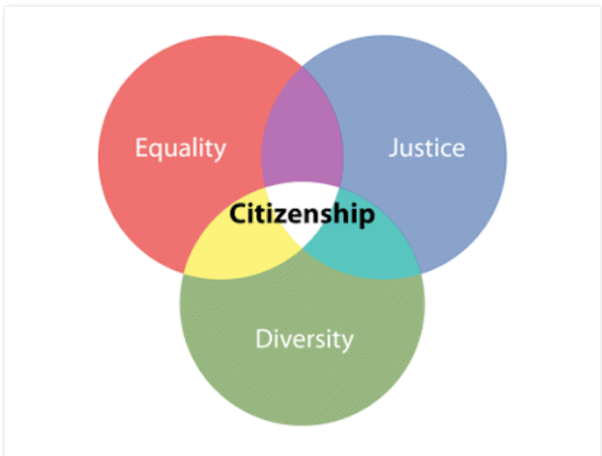
- (Articles 5 to 11) – (Part II) of the Constitution – deals with the provisions of Citizenship.
- The term citizenship entails the enjoyment of full membership of any State in which a citizen has civil and political rights.
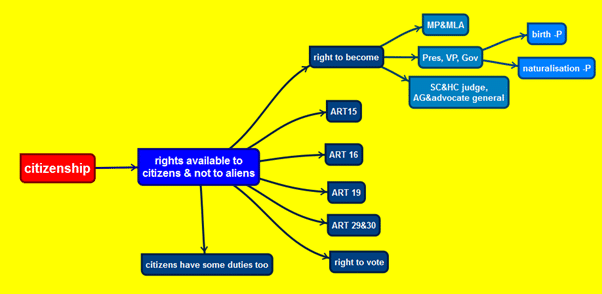
The Constitution confers the following rights and privileges on the citizens of India (and denies the same to aliens):
- Right against discrimination on grounds of religion, race, caste, sex, or place of birth (Article 15).
- Right to equality of opportunity in the matter of public employment (Article 16).
- Right to freedom of speech and expression, assembly, association, movement, residence, and profession (Article 19).
- Cultural and educational rights (Articles 29 and 30).
- Right to vote in elections to the Lok Sabha and state legislative assembly.
- The right to contest for the membership of the Parliament and the state legislature.
- Eligibility to hold certain public offices, that is, President of India, Vice-President of India, judges of the Supreme Court and the high courts, governor of states, the attorney general of India and advocate general of states.
- (In India both citizens by birth as well as a naturalized citizen are eligible for the office of President.)
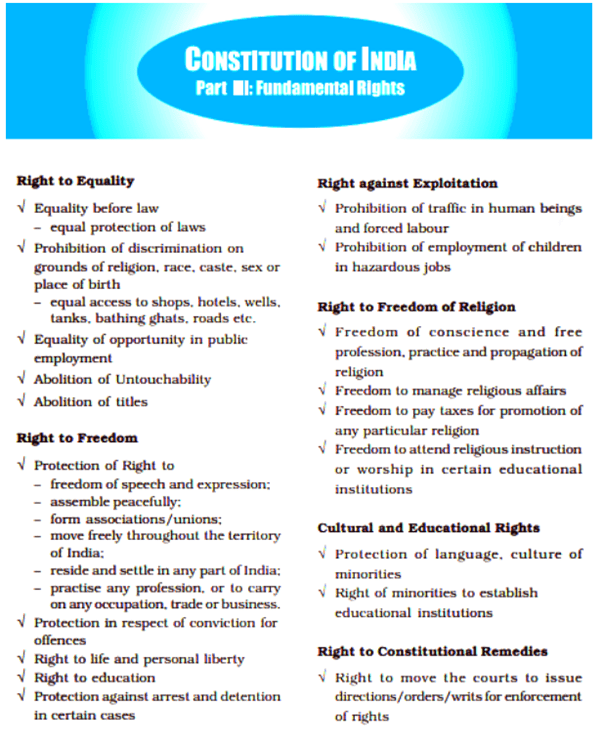
Along with the above rights, the citizens also owe certain duties towards the Indian State, as for example, paying taxes, respecting the national flag and national anthem, defending the country, and so on.
Some important facts
- The Constitution deals with citizenship from Articles 5 to 11.
- However, it only identifies the persons who became citizens of India at its commencement (i.e., on January 26, 1950).
- It does not deal with the problem of acquisition or loss of citizenship subsequent to its commencement.
- It empowers the Parliament to enact a law to provide for such matters and any other matter relating to citizenship. Accordingly, the Parliament has enacted the Citizenship Act.
- Therefore we should know about (Articles 5 to 11) and (Citizenship Act).
Provisions for Citizenship

According to the Constitution, the following four categories of persons became the citizens of India at its commencement i.e., on 26 January 1950:
➤ Article 5: Citizenship at the commencement of the constitution
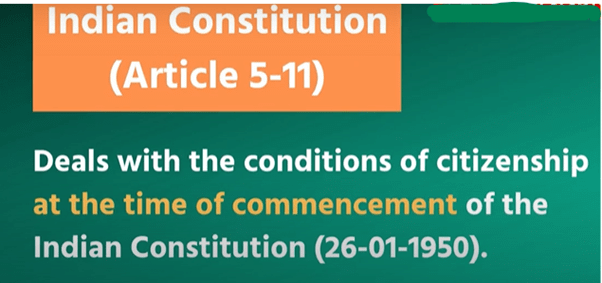
(Article 5): A person who had his domicile in India and also fulfilled any one of the three conditions, viz.,
- if he was born in India; or
- if either of his parents was born in India; or
- if he has been ordinarily resident in India for five years immediately before the commencement of the Constitution became a citizen of India
Articles 6 and 7 deal with two categories of persons, namely, those who were residents in India but had migrated to Pakistan and those who were residents in Pakistan but had migrated to India.
Those who migrated from Pakistan to India were divided into two categories:
- those who came before July 19, 1948, and
- those who came after that date.
➤ Article 6: Rights of citizenship of certain persons who have migrated to india from pakistan
- (Article 6): A person who migrated to India from Pakistan became an Indian citizen if he or either of his parents or any of his grandparents was born in undivided India and also fulfilled any one of the two conditions viz., in case he migrated to India before July 19, 1948, he had been ordinarily resident in India since the date of his migration; or in case he migrated to India on or after July 19, 1948, he had been registered as a citizen of India.
- But, a person could be so registered only if he had been resident in India for six months preceding the date of his application for registration.
➤ Article 7: Rights of citizenship of certain migrants to pakistan
- (Article 7): A person who migrated to Pakistan from India after March 1, 1947, but later returned to India for resettlement could become an Indian citizen.
- For this, he had to be resident in India for six months preceding the date of his application for registration.
➤ Article 8: Rights of citizenship of certain persons of indian origin residing outside india
- (Article 8): A person who, or any of whose parents or grandparents, was born in undivided India but who is ordinarily residing outside India shall become an Indian citizen if he has been registered as a citizen of India by the diplomatic or consular representative of India in the country of his residence, whether before or after the commencement of the Constitution.
- Thus, this provision covers the overseas Indians who may want to acquire Indian citizenship.
To sum up, these provisions deal with the citizenship of:
(a) Persons domiciled in India;
(b) Persons migrated from Pakistan;
(c) Persons migrated to Pakistan but later returned; and
(d) Persons of Indian origin residing outside India.
➤ Article 9: Persons voluntarily acquiring citizenship of a foreign state not to be citizens
- No person shall be a citizen of India or be deemed to be a citizen of India if he has voluntarily acquired the citizenship of any foreign state (Article 9).
➤ Article 10: Continuance of the rights of citizenship
- Every person who is or is deemed to be a citizen of India shall continue to be such a citizen, subject to the provisions of any law made by Parliament (Article 10).
➤ Article 11: Parliament to regulate the right of citizenship by law
- Parliament shall have the power to make any provision with respect to the acquisition and termination of citizenship and all other matters relating to citizenship (Article 11).
The Citizenship Act, 1955
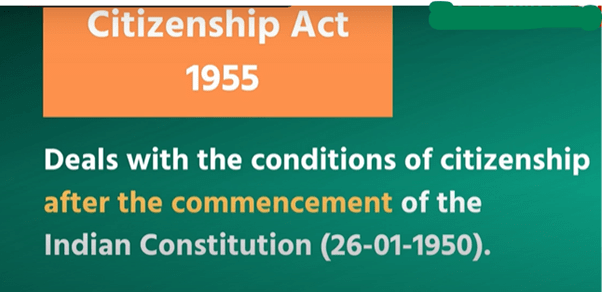
- A comprehensive law dealing with citizens was passed by Parliament in 1955 in accordance with the powers vested in it by Article 11 of the Constitution.
- The provisions of the Act may be broadly divided into three parts, acquisition of citizenship, termination of citizenship, and supplemental provisions.
Acquisition of Citizenship
The Act provides five modes of acquiring the citizenship of India. These are:
- Citizenship by birth
- Citizenship by descent
- Citizenship by registration
- Citizenship by naturalization
- By incorporation of territory (by the Government of India)
➤ By Birth
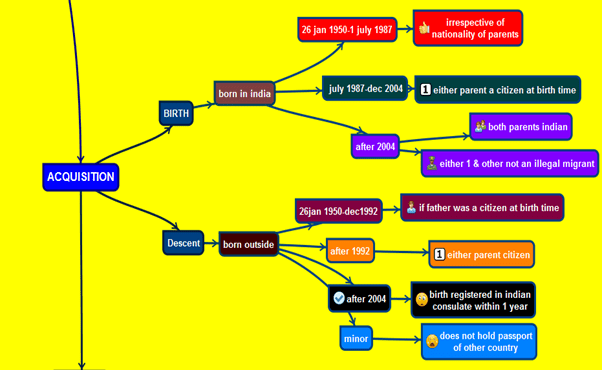
- Every person born in India on or after January 26, 1950, but before June 30, 1987, shall be a citizen of India by birth.
- A person is a citizen of India by birth if he/she is born in India on or after July 1, 1987, but at the time of the birth, either of his parents was a citizen of India.
- Note: The children of foreign diplomats posted in India and enemy aliens cannot acquire Indian citizenship by birth.
➤ By Descent
- A person born outside India on or after January 26, 1950, shall be a citizen of India by descent if his father or mother is a citizen of India at the time of his birth.
- Children of those who are citizens of India by descent, as also children of noncitizens who are in service under a government in India, may also take advantage of this provision and become Indian citizens by descent, if they so desire, through registration.
➤ By Registration
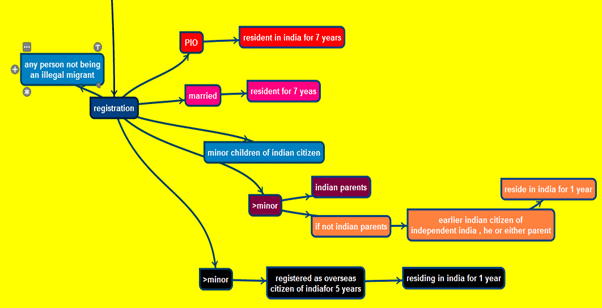
Any person who is not already an Indian citizen by virtue of the provisions of the Constitution or those of this Act can acquire citizenship by registration if that person belongs to any one of the following five categories:
- Persons of Indian origin who are ordinarily resident in India and who have been so resident for at least six months immediately before making an application for registration.
- Persons of Indian origin who are ordinarily resident in any country or place outside undivided India;
- Women who are, or have been, married to citizens of India;
- Minor children of persons who are citizens of India; and
- Persons of full age and capacity who are citizens of the Commonwealth countries or the Republic of Ireland.
➤ By Naturalisation
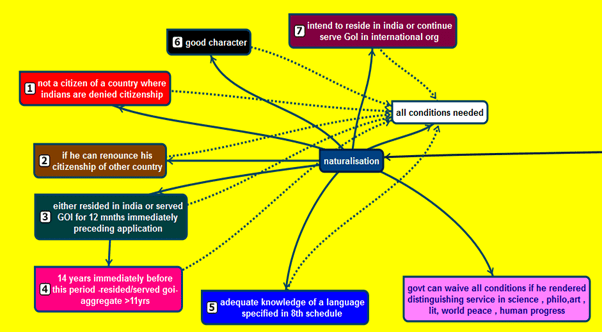
- Any person who does not come under any of the categories mentioned above can acquire Indian citizenship by naturalisation if his application for the same has been accepted by the Government of India and certificate is granted to him to that effect.
- An applicant for a naturalisation certificate has to satisfy the following conditions:
(i) He is not a citizen of a country which prohibits Indians from becoming citizens of that country by naturalization;
(ii) He has renounced the citizenship of the country to which he belonged;
(iii) He has either resided in India or has been in the service of a government in India, normally, for one year immediately prior to the date of application;
(iv) During the seven years preceding the above mentioned one year, he has resided in India or been in the service of a government in India for a period amounting in the aggregate to not less than four years;
(v) He is of good character;
(vi) He has adequate knowledge of a language specified in the Constitution;
(vii) If granted a certificate, he intends to reside in India or enter into, or continue in service under a government in India.
The Act provides, however, for a conspicuous exemption under which any or all of the above conditions may be waived in favour of a person who has rendered distinguished service to the cause of science, philosophy, art, literature, world peace or human progress generally.
Every person to whom a certificate of naturalization is granted has to take an oath of allegiance solemnly affirming that he will bear true faith and allegiance to the Constitution of India as by law established and that he will faithfully observe the laws of India and fulfil his duties as a citizen of India.
➤ By Incorporation of Territory
If any territory becomes part of India, the Government of India, by order, may specify the persons who shall be citizens of India by reason of their connection with that territory.
Termination of Citizenship
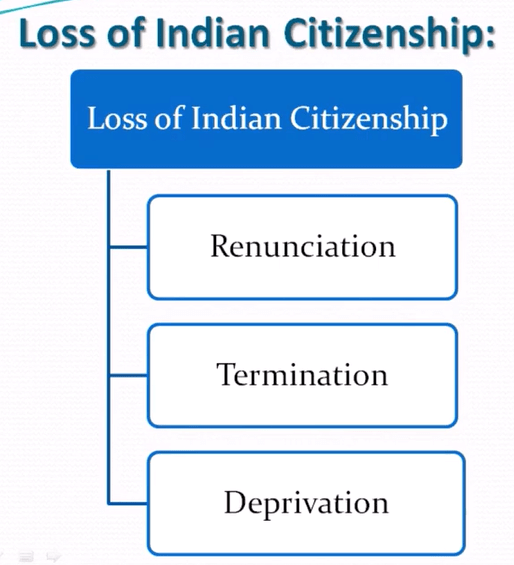
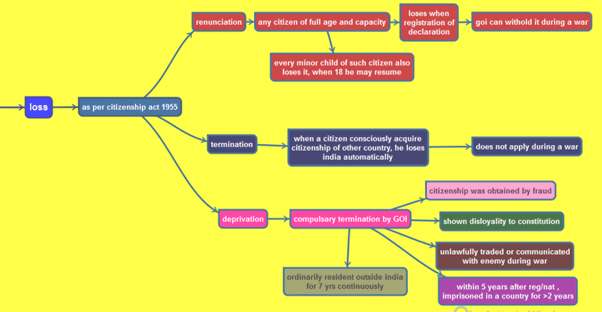 The Act envisages three situations under which a citizen of India may lose his Indian nationality. These are:
The Act envisages three situations under which a citizen of India may lose his Indian nationality. These are:
➤ By Renunciation
- If any citizen of India who is also a national of another country renounces his Indian citizenship through a declaration in the prescribed manner, he ceases to be an Indian citizen of registration of such declaration.
- When a male person ceases to be a citizen of India, every minor child of his also ceases to be a citizen of India. However, such a child may within one year after attaining full age, becomes an Indian citizen by making a declaration of his intention to resume Indian citizenship.
➤ By Termination
- Any person who acquired Indian citizenship by naturalization, registration or otherwise, or he or she voluntarily acquired the citizenship of another country at any time between January 26, 1950, the date of commencement of the Constitution, and December 30, 1955, the date of commencement of this Act, shall have ceased to be a citizen of India from the date of such acquisition.
➤ By Deprivation
- The Central Government is empowered to deprive a citizen of his citizenship by issuing an order under 10 of the act.
- But, this power of the Government may not be used in the case of every citizen; it applies only to those who acquired Indian citizenship by naturalization or by virtue only of clause (c) of Article 5 of the Constitution or by registration.
The possible grounds of such deprivation are:
- Obtaining a citizenship certificate by means of fraud, false representation, concealment of any material fact;
- Disloyalty of disaffection towards the Constitution shown by act or speech;
- Assisting an enemy with whom India is at war;
- Sentence to imprisonment in any country for a term of not less than two years within the first five years after the acquisition of Indian citizenship and
- Continuous residence outside Indian for a period of seven years without expressing in a prescribed manner his intention to retain his Indian citizenship.
- The Act also provides for reasonable safeguards in order to see that a proper procedure is followed in every case of deprivation of citizenship.
Single Citizenship
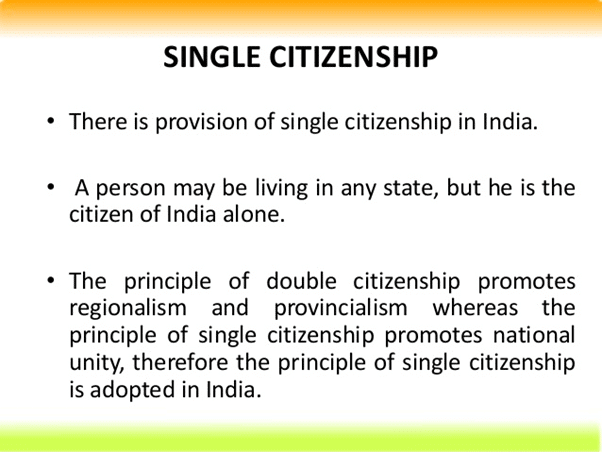
- Indian Constitution provides for only single citizenship, that is, Indian citizenship. The citizens in India owe allegiance only to the Union. There is no separate state citizenship.
- The other federal states like the USA and Switzerland, on the other hand, adopted the system of double citizenship.
- In the USA, each person is not only a citizen of the USA but also of the particular state to which he belongs.
- The Constitution of India, like that of Canada, has introduced the system of single citizenship and provided uniform rights (except in few cases) for the people of India to promote the feeling of fraternity and unity among them and to build an integrated Indian nation.
Overseas Citizen of India (OCI) and Person of Indian Origin (PIO)
- The Indian diaspora will no longer have to get a visa affixed on their passports every time they travel to India as the Union government has decided to do away with the process.
- The government has decided that since the categories Overseas Citizen of India (OCI) and the Persons of Indian Origin (PIO) were merged a few years back, the OCI card will suffice to enter the country and hence would require no visa.
- In other words, both OCI and PIO don’t need a visa to enter the country, only an OCI card will suffice.
- Carrying a passport will, however, be mandatory
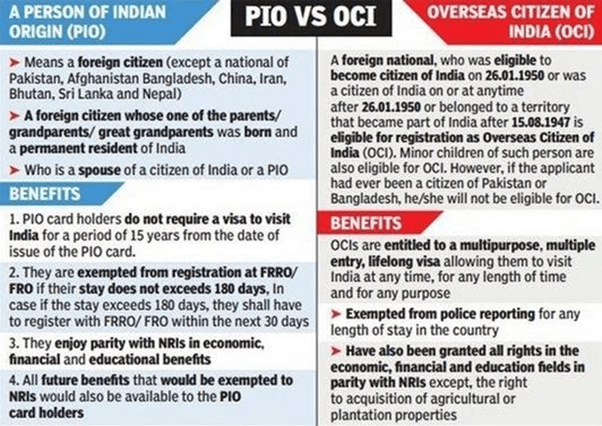
The Citizenship (Amendment) Bill, 2019
The amendment proposes to permit members of six communities — Hindus, Sikhs, Buddhists, Jains, Parsis and Christians from Pakistan, Bangladesh and Afghanistan — to continue to live in India if they entered India before December 14, 2014.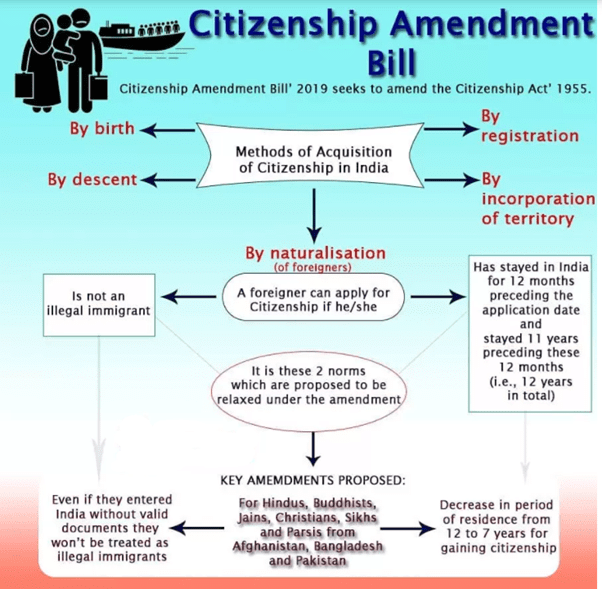
- It also reduces the requirement for citizenship from 11 years to just 6 years.
- Two notifications also exempted these migrants from the Passport Act and Foreigners Act.
- A large number of organizations in Assam protested against this Bill as it may grant citizenship to Bangladeshi Hindu illegal migrants.
- The justification given for the bill is that Hindus and Buddhists are minorities in Bangladesh, and fled to India to avoid religious persecution, but Muslims are a majority in Bangladesh and so the same cannot be said about them.
|
274 videos|372 docs|31 tests
|
FAQs on Citizenship- 3 - General Awareness & Knowledge - DSSSB TGT/PGT/PRT
| 1. What are the requirements to obtain Indian citizenship? |  |
| 2. How long does it take to acquire Indian citizenship? |  |
| 3. Can a person with Indian citizenship hold dual citizenship? |  |
| 4. Can children of Indian citizens automatically acquire Indian citizenship? |  |
| 5. Is it possible to lose Indian citizenship after acquiring it? |  |

















